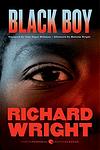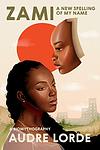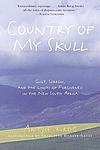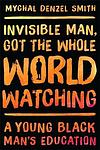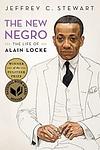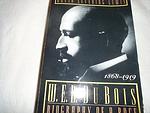The Greatest "Biography, Ethics" Books of All Time
Click to learn how this list is calculated.
This list represents a comprehensive and trusted collection of the greatest books. Developed through a specialized algorithm, it brings together 300 'best of' book lists to form a definitive guide to the world's most acclaimed books. For those interested in how these books are chosen, additional details can be found on the rankings page.
Genres
Biography is a genre of literature that focuses on the life story of a person, typically a historical figure or a celebrity. It provides a detailed account of the subject's life, including their upbringing, achievements, struggles, and personal relationships. Biographies can be written in various formats, including memoirs, autobiographies, and third-person narratives. This category of books offers readers an opportunity to gain insight into the lives of notable individuals and their impact on society.
The "Ethics" category in books encompasses a broad range of works that delve into the philosophical study of morality, values, and human conduct. It explores the principles that govern individuals' behavior and the moral frameworks that shape societies. Books in this genre often tackle questions of right and wrong, justice and injustice, virtue and vice, as well as the ethical dilemmas that arise in various aspects of life, including business, medicine, technology, and personal relationships. They may present historical perspectives on ethical thought, analyze contemporary moral issues, or offer guidance on leading a moral life. This category includes texts from ancient philosophical treatises to modern-day commentaries, featuring works by ethicists, philosophers, theologians, and other thinkers who seek to understand and influence how we make decisions that impact ourselves, others, and the world around us.
Countries
Date Range
Reading Statistics
Click the button below to see how many of these books you've read!
Download
If you're interested in downloading this list as a CSV file for use in a spreadsheet application, you can easily do so by clicking the button below. Please note that to ensure a manageable file size and faster download, the CSV will include details for only the first 500 books.
Download-
1. The Autobiography of Malcolm X by Alex Haley
This book is an autobiography narrating the life of a renowned African-American activist. It delves into his transformation from a young man involved in criminal activities to becoming one of the most influential voices in the fight against racial inequality in America. The book provides a deep insight into his philosophies, his time in prison, conversion to Islam, his role in the Nation of Islam, his pilgrimage to Mecca, and his eventual split from the Nation. It also addresses his assassination, making it a powerful account of resilience, redemption, and personal growth.
-
2. The Souls of Black Folk by W. E. B. Du Bois
This seminal work is a collection of essays that explores the history and condition of African Americans at the turn of the 20th century. It delves into the issues of race, class, and the socio-economic realities faced by black people post-emancipation. The author employs a combination of history, sociology, and personal narrative to present a powerful critique of American society, highlighting the struggle for civil rights, the importance of black spirituals, and the concept of "double consciousness" - the idea of viewing oneself through the lens of a society that sees you as inferior.
-
3. Black Boy by Richard Wright
"Black Boy" is an autobiographical account of a young African-American boy growing up in the South during the early 20th century. The book explores his experiences with extreme poverty, racism, and his struggle to find his place in a society that marginalizes and devalues him. The protagonist's desire for self-expression and understanding leads him to a love of literature and writing, providing him with a means to challenge and critique the oppressive social structures around him.
-
4. Incidents in the Life of a Slave Girl by Harriet Jacobs
This book is a poignant autobiography that depicts the life of a young woman born into slavery in the southern United States in the early 19th century. The narrative provides a harrowing account of her childhood and adolescence, marked by abuse and exploitation. In her desperate quest for freedom, she spends seven years in a tiny attic, hiding from her oppressive master. The narrative serves as a powerful critique of the brutalities of slavery, and a testament to the author's indomitable spirit and pursuit of freedom.
-
5. Zami: A New Spelling of My Name by Audre Lorde
This book is a biomythography, blending history, biography, and myth, of a young, black, lesbian woman growing up in 1950s Harlem. The narrative explores her early life, including her relationship with her immigrant parents, her sexual awakening, and her struggle to define her identity in a time of intense racial and homophobic prejudice. The protagonist's journey is marked by a series of women who shape her consciousness and her understanding of herself, leading her towards activism and writing.
-
6. Down Second Avenue by Es'kia Mphahlele
"Down Second Avenue" is a semi-autobiographical account of a black man's life under apartheid in South Africa. The narrative chronicles the protagonist's journey from childhood to adulthood, detailing his experiences with poverty, discrimination, and the struggle for education. Despite the harsh realities of life under apartheid, the protagonist's resilience and determination shine through, offering a poignant and powerful critique of the socio-political realities of the time.
-
7. Dreams from My Father by Barack Obama
This memoir explores the life of a man who grew up in a multicultural family, with a Kenyan father and an American mother. The narrative delves into his early years in Hawaii and Indonesia, his self-discovery and racial awakening in Chicago, and his journey to Kenya to learn more about his father's heritage. The book provides an introspective look at the author's struggle with his racial identity, his relationship with his family, and his path to finding his place in the world.
-
8. Between the World and Me by Ta-Nehisi Coates
The book is a profound work that explores the concept of race in America through the lens of the author's personal experiences. It is written as a letter to the author's teenage son, offering him a stark portrayal of his place in a society that is marked by racial injustice. The narrative provides a deeply personal analysis of American history and its lasting impact on the African American community, with the author sharing his experiences of fear, violence, and struggle. It is an exploration of the physical and psychological impacts of being black in the United States, and a call for a deeper understanding of the nation's racial history.
-
9. Common Ground by J. Anthony Lukas
"Common Ground" is a non-fiction book that provides an in-depth examination of racial tensions in Boston, Massachusetts during the 1960s and 1970s, primarily focusing on the controversial issue of court-ordered busing to integrate public schools. The narrative follows three families - one African-American, one Irish-American, and one Yankee - to depict the effects of these tensions on the city's different communities. The book also explores the historical, political, and social context of these events, offering a comprehensive analysis of a critical period in American history.
-
10. Country Of My Skull by Antjie Krog
"Country Of My Skull" is a powerful and deeply personal account of the author's experiences as a journalist covering the Truth and Reconciliation Commission in post-apartheid South Africa. Through her vivid and introspective narrative, the author explores the complexities of forgiveness, justice, and the collective healing process of a nation grappling with its painful past. This thought-provoking book offers a unique perspective on the complexities of reconciliation and the enduring impact of trauma on individuals and societies.
-
11. The Silent Steppe: The Story Of A Kazakh Nomad Under Stalin by Mukhamet Shayakhmetov
"The Silent Steppe: The Story Of A Kazakh Nomad Under Stalin" is a gripping memoir that chronicles the life of a Kazakh nomad during the brutal reign of Stalin. The book offers a firsthand account of the hardships, persecution, and forced collectivization experienced by the Kazakh people under Soviet rule. Through the eyes of the author, readers gain insight into the resilience, traditions, and struggles of the Kazakh nomadic culture in the face of political oppression.
-
12. A Testament of Hope: The Essential Writings and Speeches of Martin Luther King, Jr. by Martin Luther King
This book is a comprehensive collection of the significant writings and speeches of a renowned civil rights leader. It includes his most influential and inspirational works, such as the "I Have a Dream" speech and the "Letter from Birmingham Jail", among many others. The book provides a deep insight into his thoughts, philosophies, and strategies for nonviolent protests, and his passionate advocacy for equality, justice, and dignity for all. It serves as a testament to his enduring hope for a more inclusive and equitable society.
-
13. Sons of Mississippi by Paul Hendrickson
"Sons of Mississippi" is a powerful exploration of the legacy of racism in the American South. The book uses a famous photograph of seven Mississippi sheriffs preparing to thwart James Meredith's integration of the University of Mississippi in 1962 as a starting point. The author then traces the lives and descendants of these men, providing a deep and nuanced look at the enduring effects of prejudice and discrimination, as well as the struggle for civil rights and racial equality in the United States.
-
14. Invisible Man, Got the Whole World Watching by Mychal Denzel Smith
This book is an exploration of the intersection of race, gender, and politics in modern America, as seen through the eyes of a young black man. It examines the impact of key figures like Barack Obama, Trayvon Martin, and Michael Brown, while also delving into the author's personal experiences with mental health, masculinity, and the shifting landscape of black identity. The narrative is a mix of memoir, cultural criticism, and political commentary, offering a powerful and insightful look at the complexities of black manhood in the 21st century.
-
15. The New Negro: The Life of Alain Locke by Jeffrey C. Stewart
This comprehensive biography delves into the life and work of Alain Locke, the first African American Rhodes Scholar and a leading figure in the Harlem Renaissance. The book explores Locke's upbringing, his education, and his struggles with racism and homophobia. It also highlights his role in promoting and shaping black culture and arts during the Harlem Renaissance, his philosophy of the "New Negro," and his influence on a generation of African American artists and intellectuals.
-
16. The Black Count: Glory, Revolution, Betrayal, and the Real Count of Monte Cristo by Tom Reiss
This book tells the true story of General Alex Dumas, a man of mixed race who rose to power in France during the French Revolution. Despite his achievements and contributions, Dumas faced severe racial discrimination and was eventually imprisoned. His life and experiences served as inspiration for his son, who became a famous novelist. The book explores themes of race, class, and the struggle for equality, providing a fascinating look at a lesser-known figure in French history.
-
17. W.E.B. Du Bois: The Fight for Equality and The American Century by David Levering Lewis
This biography delves into the life of W.E.B. Du Bois, a prominent African-American civil rights activist and scholar. It explores his tireless fight for racial equality in the United States during the 20th century. The book chronicles his role as a founder and leader of the NAACP, his influence in the Harlem Renaissance, his controversial advocacy for black separatism, and his later years as an expatriate in Ghana. It paints a comprehensive picture of Du Bois as a key figure in the struggle for civil rights and the shaping of the American century.
Reading Statistics
Click the button below to see how many of these books you've read!
Download
If you're interested in downloading this list as a CSV file for use in a spreadsheet application, you can easily do so by clicking the button below. Please note that to ensure a manageable file size and faster download, the CSV will include details for only the first 500 books.
Download

